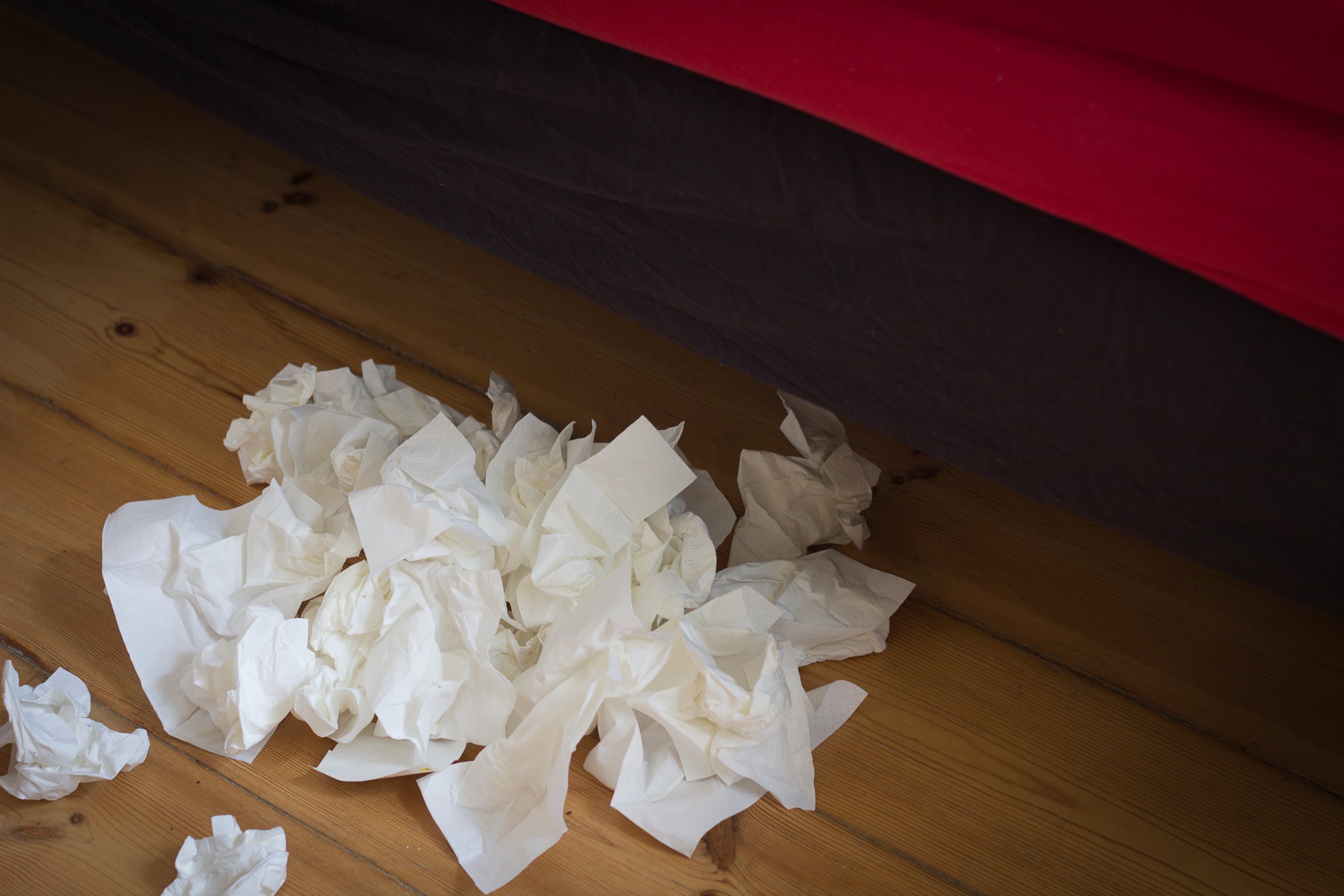
It’s not fair. You’ve been looking forward to this for months. And now here you are, two days into your break, and you’ve caught a cold. Or worse, a stomach bug or flu. Why does this always happen to you?
It’s not just you. This frustrating phenomenon is so common that Dutch researchers have come up with a name for it: “leisure sickness.” One 2002 study from Tilburg University in the Netherlands found 3.2% of adults experience headaches, muscle pain, or illness during their time off.
There are actually good reasons for that, some more obvious than others.
For one, placing yourself in a crowded, tightly sealed virus incubator—also known as an airplane—is always risky, says Dr. William Schaffner, a professor of preventive medicine at Vanderbilt University School of Medicine.
MORE: You Asked: Is It Bad to Be Inside All Day?
Schaffner says a plane’s air-management system segments the aircraft “like a sliced hot dog.” If you happen to be in a section with someone who is coughing or sneezing, it’s tough for you to avoid breathing in her germs. If you’re traveling during cold-and-flu season—a period that starts sometime in November and peaks in February—you’re really rolling the dice. There’s not much you can do, other than searching out a seat farther away from stuffed-up passengers. Masks don’t even work well. Your best safeguard is to wash your hands frequently, and keep them away from your nose, mouth, and ears. (Taking a shower and changing your clothes when you land won’t hurt either.)
Unfortunately, Airborne and other widely used immune-system supplements probably won’t help. “They’ve never been studied in clinical trials, and there’s no proof they have any effect,” Schaffner says. “I don’t take them myself, and I don’t recommend them.” Regular exercise is a better way to boost your immune function leading up to a break.
MORE: You Asked: Are Airport Body Scanners Safe?
If you’re heading to Latin America, “Montezuma’s revenge” (a.k.a., traveler’s diarrhea) is a real threat, Schaffner says. The condition is usually caused by bacteria in tap water. Stick to the bottled stuff, and avoid drinks containing ice. “Don’t eat anything that hasn’t been either cooked or peeled,” he adds. (If you really want to play it safe, salads are a no-no.)
Even if you’re fortunate enough to avoid the sick people on the plane and intestinal distress, there are other aspects of traveling that may strike you down. Switching up your routines may explain some of your vacation illness.
“Not eating, drinking, or sleeping the way you normally do can make you prone to sickness,” says Dr. Laura Power, associate director of preventive medicine residency at the University of Michigan School of Public Health.
Your sleep, appetite, immune function, and much else are governed by your body’s circadian rhythms. So if you’re the type who normally operates on a tight, unvarying schedule—you can predict down to the minute when you’ll take your first sip of coffee in the morning—switching time zones and sleeping in late can mess with your system in ways that may promote illness. (Just delaying your morning coffee an hour or two is enough to trigger a headache.)
But there are ways to lessen your chances of succumbing to leisure sickness. You can ease your body into a new time zone and avoid jet lag by adjusting your morning or evening exposures to bright light, and taking melatonin. But sticking to your normal sleep-wake schedules is your best safeguard.
MORE: 12 Work-Life Balance Tips That Will Make You a Happier and More Successful Person
Taking it easy when it comes to booze is also a good idea, despite the temptation to overindulge while on break. “In laboratory models, binge exposure to alcohol weakens the immune response to pathogens,” says Aaron White, a senior scientific advisor with the National Institute on Alcohol Abuse and Alcoholism.
Then there’s the role of stress. The grind you put your body and brain through leading up to a vacation can make you weaker during your break. Who hasn’t worked late hours or gone a little crazy tying up loose ends before a trip? The stress that produces can shift your immune system into high gear, Power says. But once you escape your pre-vacation duties and your stress levels drop, your immune system may also downshift—leaving you exposed to pathogens. “You’re not sleeping enough and working really hard in anticipation of a vacation, and then you get on a plane,” she says. Throw in a big time-zone change and a first night of heavy drinking, and it’s easy to see why you may wake up on day-two or three of your vacation with a cold.
“It might help not to try to wrap everything up before you leave,” she suggests.
If that sounds crazy to you, new research may change your mind. Most of us may believe “looming” or incomplete work will prevent us from having fun, but that’s not the case, according to a recent University of Chicago study. In that report, people experienced similar levels of leisure-time enjoyment regardless of whether they’d completed their work before goofing off.
So go ahead and back-burner that big report until you get home. Remember to wash your hands and watch your drinking, and maybe skip the pico de gallo. And if the dude next to you on the plane is coughing up a lung? Cross your fingers and hope your immune system kicks into high gear.
More Must-Reads from TIME
- Inside Elon Musk’s War on Washington
- Meet the 2025 Women of the Year
- The Harsh Truth About Disability Inclusion
- Why Do More Young Adults Have Cancer?
- Colman Domingo Leads With Radical Love
- How to Get Better at Doing Things Alone
- Cecily Strong on Goober the Clown
- Column: The Rise of America’s Broligarchy
Contact us at letters@time.com



